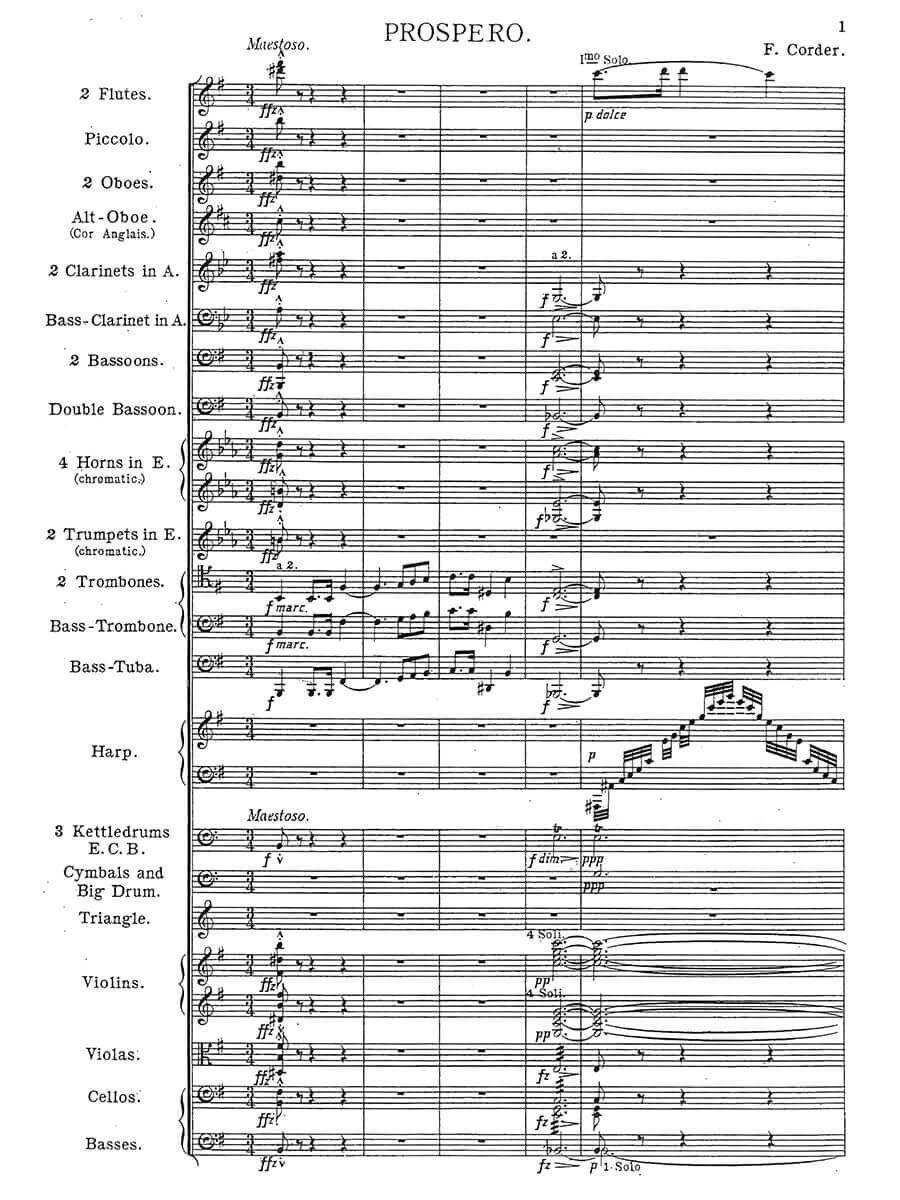Prospero, Concert Overture
Corder, Frederick
21,00 €
Preface
Frederick Corder
(b. London, 26th January 1852 – d. London 21st August 1932)
Prospero
Op.14
Concert Overture for full orchestra
First performed at the Crystal Palace, Sydenham, London, October 24th 1885,
the orchestra conducted by August Manns.
Preface
Frederick Corder was born in Hackney, London, to musical parents who encouraged him to take piano and violin lesson as a child. Having left school he prepared for a career in business, but after three years he withdrew from this sphere of activity and managed to convince his parents that he was best suited for further musical training. In 1873 at the Royal Academy of Music he came under the tutelage of the formidable George Macfarren, who lectured on harmony and composition; unfortunately Macfarren had no love of the music of Wagner – whom Corder idolized. Corder won the Mendelssohn Scholarship in 1875 which allowed him to go and study at the Cologne Conservatoire with Ferdinand Hiller for composition and Isidor Seiss for piano. The wealth of musical activity in this north German city undoubtedly stimulated the young man, even if Hiller’s outlook at the conservatoire was as conservative as Macfarren’s had been in London. On his return to London Corder found making a living from his training and skills very difficult indeed, and he also had a wife – Henrietta Louisa (née Walford) – to support: „Behold me when my scholarship was up, like Robinson Crusoe, taking stock of my belongings and prospects. I had had an excellent training in things which were of no practical service to me; I played the pianoforte just not well enough to play in public, and the violin hardly at all. There was, as there is now, no possible opening for a composer, and I was thrust into an organist’s appointment, though I had never studied the instrument. On a pound a week we lived in one room and were quite happy, in spite of the gloomy outlook.“ (RAM Club Magazine, November 1909)
Corder wrote articles for Grove’s Dictionary and for various music magazines: for the Musical Times he penned a series of well-informed articles on Wagner’s operas. He arranged music and wrote translations of songs. With his wife he made pioneering English versions of Wagner, which did much to spread the popularity of the composer in England. In 1880 he was appointed as director of music at the Brighton Aquarium where he conducted a small but efficient orchestra of 18 players. This was valuable experience for Corder as it enabled him to become acquainted with Classical symphonies and numerous other orchestral works. While doing all this essentially hackwork Corder was gradually becoming known as a composer. His works of these years include a set of trios for female voices entitled River Songs (1881), an overture Ossian (1882) written for the Philharmonic Society, Dreamland (1883) – an ode for chorus and orchestra, a Suite of Rumanian Dances (1883) for violin and piano, and the present concert overture Prospero (1885). When commissioned to write a cantata for the Wolverhampton Festival of 1886 he produced his best-known work, The Bridal of Triermain (after Sir Walter Scott’s romantic poem of knight-errantry). In 1887 his opera Nordisa was brought out by the Carl Rosa Company at Liverpool to great acclaim, and it continued to be well received in the provinces if not in the capital. Corder’s hope of becoming an operatic composer suffered a setback with Rosa’s death in 1889, but in this same year he was offered the post of Professor of Harmony and Composition at his old alma mater, the Royal Academy of Music. He was a gifted teacher, and his classes became famous throughout the land, indeed for a long period they were almost identified with the re-birth of British music and the rise of a spirit of adventure and independence among British composers. Students who benefitted from his guidance include many of the leaders of the so-called ‘British Renaissance’: J.B.McEwen, Granville Bantock, Josef Holbrooke, York Bowen and Arnold Bax. Corder’s teaching duties necessarily limited the time available for his own composition. Instead he poured his energies into writing books and manuals, including monographs on Liszt, Wagner and Beethoven. He retired from the RAM in 1924.
Read full preface > HERE
Score Data
| Special Edition | The Phillip Brookes Collection |
|---|---|
| Genre | Orchestra |
| Size | 210 x 297 mm |
| Printing | Reprint |
| Pages | 66 |
